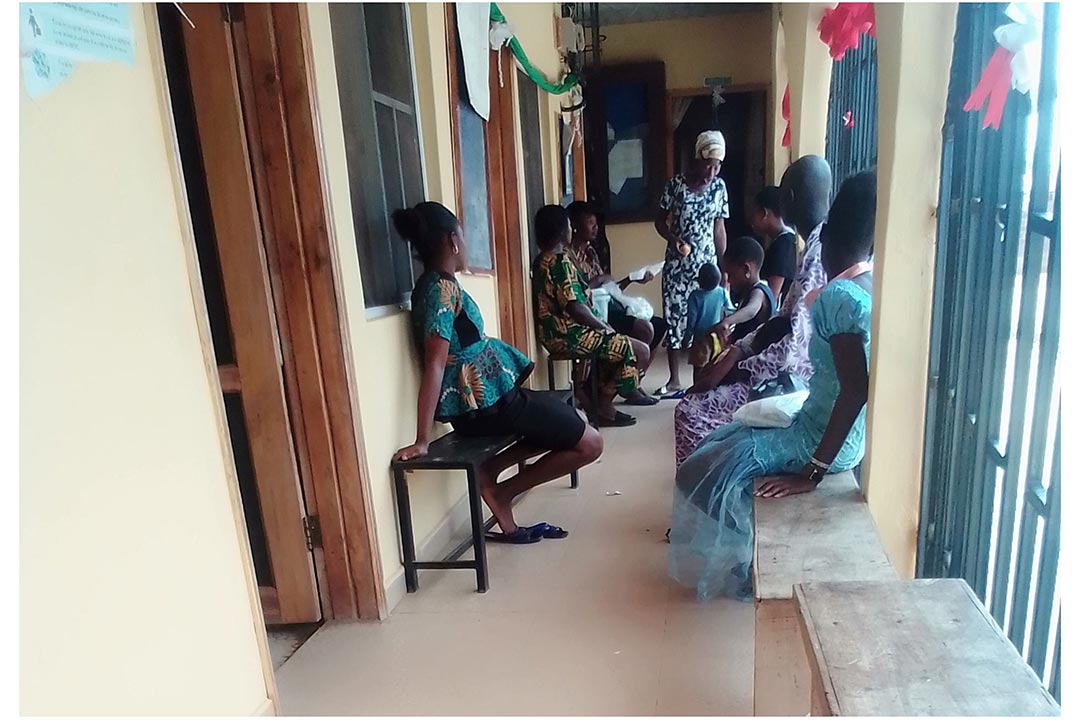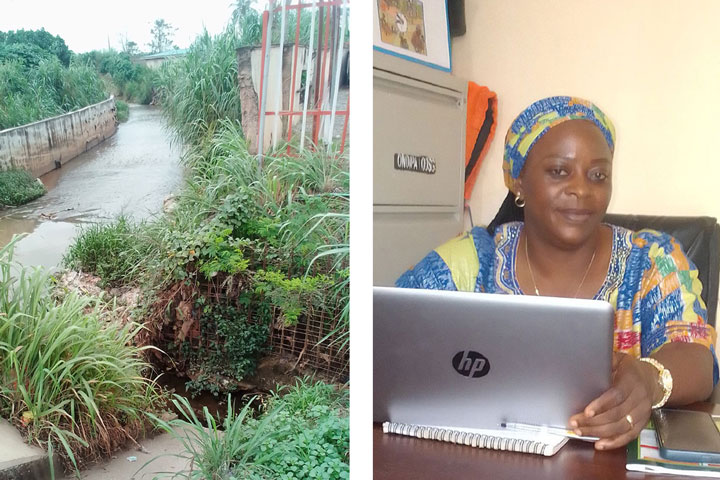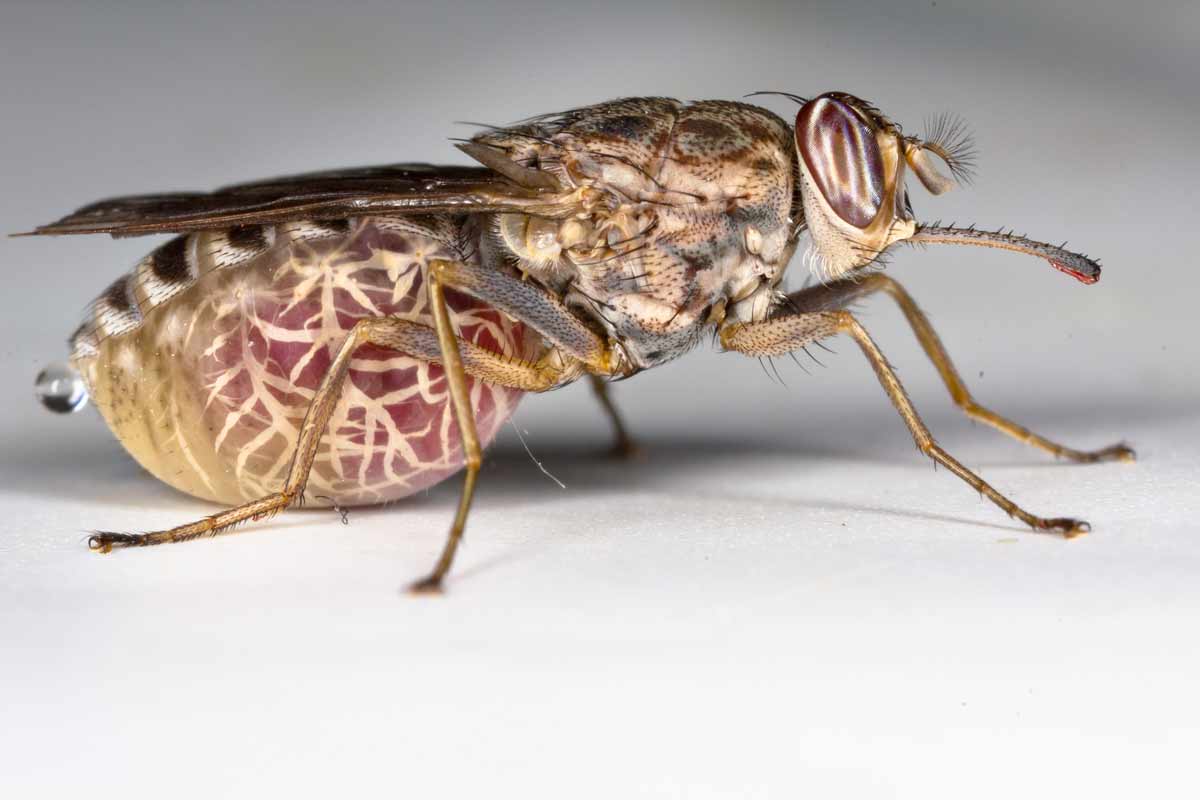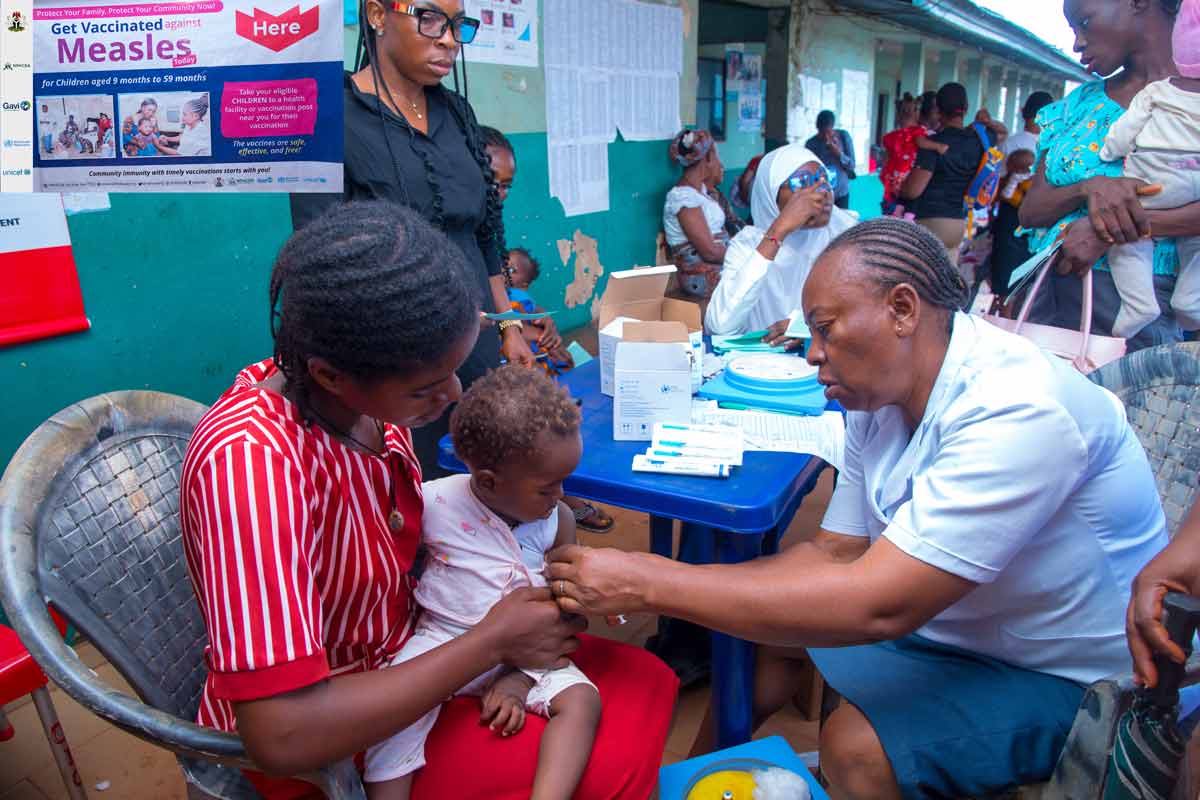Nigeria’s diphtheria nightmare is not yet over
Some 22,000 Nigerians are suspected to have been infected with the deadly vaccine-preventable disease in the past year. But health workers in some of the worst-affected areas say immunisation rates are picking up.
- 20 February 2024
- 6 min read
- by Adetokunbo Abiola
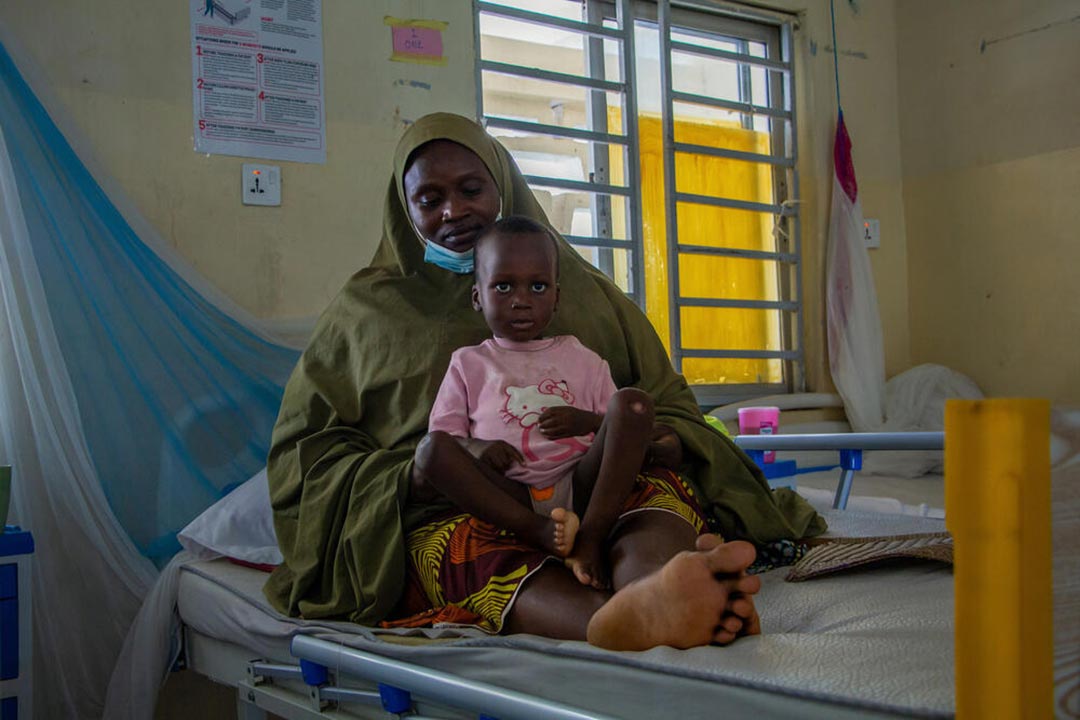
"I was like other people. I didn't take immunisation seriously before. I thought it was a waste of my time, until Shehu fell ill," said Zainab Ahmed.
A hot December breeze blew into the hall of the Federal Teaching Hospital in Katsina, north-west Nigeria. Shehu, aged four, sat on Ahmed's lap, eying the approaching doctor apprehensively. He gave a little cry.
The child had spent a harrowing three days in this hall, where, along with about 20 other boys and girls, he had received treatment for diphtheria, a vaccine-preventable disease that, in the year to December 2023, had killed almost 600 people and infected a suspected 22,000 others in Nigeria.
"I was like other people. I didn’t take immunisation seriously before. I thought it was a waste of my time, until Shehu fell ill."
– Zainab Ahmed, mother, Katsina
"A neighbour told me that I should come to the hospital or he would die," Ahmed recounted. "She said it was because I didn't immunise Shehu after he was born. Someone said the disease was called diphtheria. I have learnt my lessons. From now on, I will immunise my children against diseases."
Vaccine-preventable, but spiking
Caused by the bacterium Corynebacterium diphtheriae, diphtheria is a highly contagious vaccine-preventable illness. Symptoms often come on gradually, starting with fever and a sore throat.
The bacteria release a toxin that begins to kill the tissue lining the throat, causing tell-tale patches to form, and eventually resulting in a thickening layer of dead tissue that can block the airways, obstructing breathing.
This respiratory form of the disease is fatal in one in ten cases, even with a proper treatment regimen involving supportive care and the use of the diphtheria antitoxin. Without treatment, fatality rates rise as high as 50%.
Vaccines against diphtheria have been available since the early 20th century. As part of the basic diphtheria, tetanus and pertussis containing vaccine (DTP), diphtheria vaccines reach about 89% of children worldwide today.
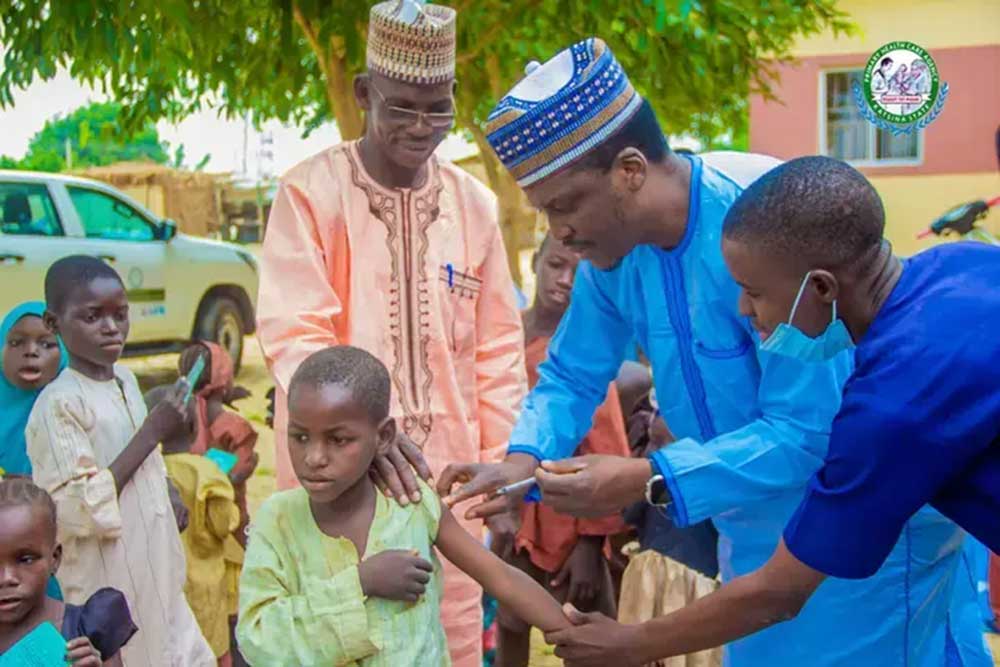
Credit: Katsina State Primary Healthcare Agency.
But Nigeria's coverage figures lag the worldwide rate, with 70% of children receiving just one dose of the DTP vaccine, and just 62% receiving all three. The COVID-19 pandemic had knocked back previous gains won by the immunisation system, with the cohort of unprotected "zero-dose" children in Nigeria swelling to 2.2 million children by 2021.
The current outbreak, confirmed in December 2022 by the Nigeria Centre for Disease Control and Prevention (NCDC), has spread to nearly half of Nigeria's 36 states in the months since. The country's north-west has been worst-hit.
"Sometimes, we vaccinate as many as 60 children. In the past, before the [epidemic], we only vaccinated about 10 people a day."
– Rahila Haruna, routine immunisation officer, Gabasawa Primary Health Care Centre, Kano
According to a recent study led by researchers at the University of Ilorin, "waning immunity due to low DTP coverage" is the "primary cause" of recurrent diphtheria in Nigeria. "The main causes of low DTP coverage are insufficient supply, inefficient cold chain system and low uptake due to poor health literacy and negative socio-cultural and religious beliefs," the study authors found.
Nigeria's international partners have stepped up in support. "We have circulated 11.7 million doses of the highly effective pentavalent vaccine, which protects children from five life-threatening diseases – diphtheria, pertussis, tetanus, hepatitis B and Hib," Tokunbo Oshin, Gavi's Director of High Impact Countries, told the press in October.
Fighting back
In Kano, like elsewhere, efforts to stalemate the epidemic are underway. More than 670,000 eligible children aged 4–14 years old across 18 high-burden local government districts had, by October's end, received a dose of tetanus-diphtheria vaccine, while a further 75,000 zero-dose children under the age of two received their very first dose of the pentavalent vaccine.
Have you read?
The state had taken delivery of a million doses of diphtheria-tetanus vaccines in September, which would be administered in cycles in 22 Local Government Areas (LGAs) in the final quarter of 2023, Dr Abubakar Labaran Yusuf, Kano State Commissioner for Health, told the press.
One of those LGAs is Gabasawa, where Rahila Haruna, a routine immunisation officer at the local primary health care centre, said anti-diphtheria vaccination rates have picked up.
“Ondo State has not recorded any diphtheria case, because we take vaccination seriously. Still we are always on the alert, because some neighbouring states are already recording the outbreak of the disease. Our measures are why we haven't recorded any outbreak."
– Professor Francis Faduyile, Special Adviser to the Ondo State Governor on health
"Just before you called, about 30 children received pentavalent vaccines," she told VaccinesWork. "Vaccination takes place twice in a week. We go outside in an outreach to vaccinate poor people, or stay in the centre for them to come and see us. Today, they came to see us. Sometimes, we vaccinate as many as 60 children. In the past, before the [epidemic], we only vaccinated about 10 people a day."
In Katsina State, an anti-diphtheria offensive has zeroed in on nine hard-hit LGAs.
"The state recorded 655 suspected cases of the disease, with some deaths. Our vaccination campaign targeted children between 6 weeks to 14 years in nine local government areas – Katsina, Charanchi, Dutsinma, Ingawa, Kaita, Kusada, Mai'adua, Musawa and Zango," Shamsudeen Yahaya, the Executive Secretary of the Katsina State Primary Health Care Agency (SPHCA), told the press in October.
"The governor approved the procurement and distribution of drugs and commodities worth millions of naira to prevent and control the outbreak," he said.
“I thank Allah that my son survived. I will always immunise my sons against diseases from now on. I don’t want to go through this experience again, battling to save my child from diphtheria. It’s a very scary situation. I didn’t sleep throughout.”
– Zainab Ahmed, mother, Katsina
Amina Yusuf, a routine immunisation officer at Dumorkol Primary Health Care Centre at Mai'adua Local Government Area told VaccinesWork that she sees the impact of the state-level strategy at her vaccination clinics.
"The weekly immunisation uptake of children has increased. In the past, before the diphtheria pandemic, we could vaccinate 20 people in a day. Now we record as much as 40," she said.
Bracing against infection in diphtheria-free Ondo
"Ondo State has not recorded any diphtheria case, because we take vaccination seriously. Still we are always on the alert, because some neighbouring states are already recording the outbreak of the disease. Our measures are why we haven't recorded any outbreak," said Professor Francis Faduyile, Special Adviser to the Ondo State Governor on health.

Credit: Adetokunbo Abiola
"We ensure our children are vaccinated to guard against the incidence of the disease. Advocacy work continues unabated. The governor directed the Ministry of Health to increase the information about diphtheria. The Primary Health Care Development Agency has taken up the challenge by releasing information about diphtheria. At state executive council meetings, issues related to diphtheria always come up, and needful actions are taken," Faduyile said in a statement.
Regret – and relief – in Katsina
Back in Katsina, Zainab Ahmed, Shehu's mother, regrets not taking the needful action ofimmunising her son against diphtheria, because if she had, she wouldn't have spent days at the Federal Teaching Hospital, hoping for her son's survival
"I thank Allah that my son survived. I will always immunise my sons against diseases from now on. I don't want to go through this experience again, battling to save my child from diphtheria. It's a very scary situation. I didn't sleep throughout," she told VaccinesWork.
